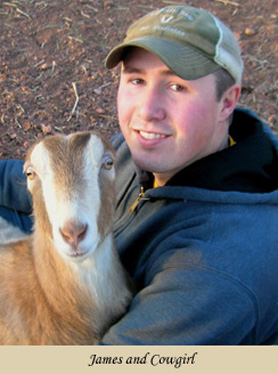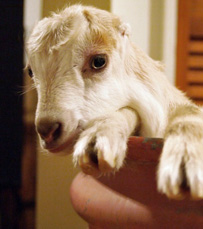Herd Health
No matter where you get your goat, make sure you get a healthy one!
 Herd health is exceptionally important to us. We feel you cannot truly maximize genetic potential without proper care and management.
Herd health is exceptionally important to us. We feel you cannot truly maximize genetic potential without proper care and management.
The Right Start
We remove our kids immediately at birth and raise them on a CAE prevention program of bovine colostrum from a mycoplasma and johnees free herd and pasteurized goat milk/yogurt. Each kid is started by hand in the house and then moved to the kid pens and a lambar. We continue to feed pasteurized milk/yogurt to our own kids for at least 3 months, and use a coccidiosis prevention program. We recommend that you continue feeding your new Rancho-Snowfall kid with a similar program.
Testing, A Measure of Success
We have developed a testing program that focuses on being highly sensitive for many of the main contagious goat diseases, and although no testing program is perfect we feel this is one of the soundest management practices you will find.
Our most recent herd test results include:
• November 22, 2011:test Negative for CAE on Colorado State Universitys AGID Test,
Negative for CL on the UC-Davis SHI Titer Test
• December 2010 from Washington State (WADDL) negative for CAE (ELISA test), CL, Johnes.
• September 3, 2009 from Colorado State University Agar Gel Immunodiffusion (AGID) test, negative for CAE.
• September 23, 2008 from Colorado State University Polymerase Cain Reaction (PCR) test, negative for CAE.
• Caprine Arthritis Encephalitis (CAE):
After working with several world renowned virologists, the consensus was to rotationally test, using all three commonly available CAE diagnostics. This gives us the highest level of confidence in being CAE free.
•Caseous Lymphadenitis (CL):
With the increased prevalence of Caseous Lymphadenitis (CL) in goats throughout our area we have elected to increase our surveillance. Although you will hear of breeders promoting a vaccine, it is important to understand that this vaccine does NOT prevent infection. It works by lessening the severity of the diseases symptoms and can affect future testing of a herd. It is important to understand that once a property is contaminated with this bacteria it can live in the soil for years, continually re-infecting and killing off animals.
 We also monitor for mycoplasma, johnes, scrapie, and tuberculosis while never having a positive animal. We would be happy to furnish you with a copy of our results or a health history on any animals of interest. If you have specific testing or management needs for adding a new Rancho-Snowfall animal to your herd, do not hesitate to contact us.
We also monitor for mycoplasma, johnes, scrapie, and tuberculosis while never having a positive animal. We would be happy to furnish you with a copy of our results or a health history on any animals of interest. If you have specific testing or management needs for adding a new Rancho-Snowfall animal to your herd, do not hesitate to contact us.
Husbandry
Our does are provided with fresh clean water, sodium bicarbonate, and a selection of rotational mineral blends based on productivity, forage, and our location. We provide our milking does with quality alfalfa, some browse, and a basic grain mix. As our does dry up they are moved to either a grass or grass blend hay. Our herd is dewormed on an individual basis, as determined by fecal test results. Each animal is on a comprehensive vaccination routine.
updated 5/2013
